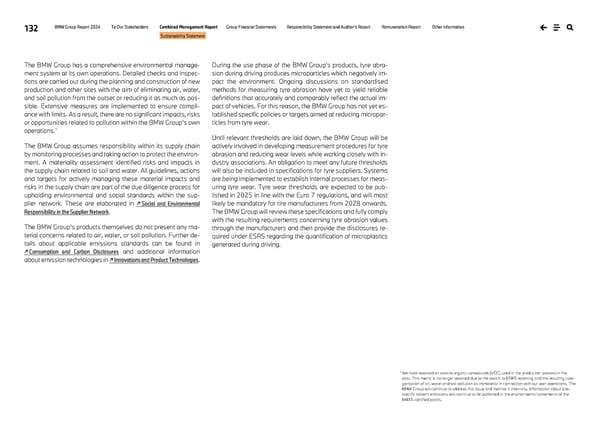132 BMW Group Report 2024 To Our Stakeholders Combined Management Report Group Financial Statements Responsibility Statement and Auditor’s Report Remuneration Report Other Information Sustainability Statement The BMW Group has a comprehensive environmental manage- ment system at its own operations. Detailed checks and inspec- tions are carried out during the planning and construction of new production and other sites with the aim of eliminating air, water, and soil pollution from the outset or reducing it as much as pos- sible. Extensive measures are implemented to ensure compli- ance with limits. As a result, there are no significant impacts, risks or opportunities related to pollution within the BMW Group’s own operations.* The BMW Group assumes responsibility within its supply chain by monitoring processes and taking action to protect the environ- ment. A materiality assessment identified risks and impacts in the supply chain related to soil and water. All guidelines, actions and targets for actively managing these material impacts and risks in the supply chain are part of the due diligence process for upholding environmental and social standards within the sup- plier network. These are elaborated in ↗ Social and Environmental Responsibility in the Supplier Network. The BMW Group’s products themselves do not present any ma- terial concerns related to air, water, or soil pollution. Further de- tails about applicable emissions standards can be found in ↗ Consumption and Carbon Disclosures and additional information about emission technologies in ↗ Innovations and Product Technologies. During the use phase of the BMW Group’s products, tyre abra- sion during driving produces microparticles which negatively im- pact the environment. Ongoing discussions on standardised methods for measuring tyre abrasion have yet to yield reliable definitions that accurately and comparably reflect the actual im- pact of vehicles. For this reason, the BMW Group has not yet es- tablished specific policies or targets aimed at reducing micropar- ticles from tyre wear. Until relevant thresholds are laid down, the BMW Group will be actively involved in developing measurement procedures for tyre abrasion and reducing wear levels while working closely with in- dustry associations. An obligation to meet any future thresholds will also be included in specifications for tyre suppliers. Systems are being implemented to establish internal processes for meas- uring tyre wear. Tyre wear thresholds are expected to be pub- lished in 2025 in line with the Euro 7 regulations, and will most likely be mandatory for tire manufacturers from 2028 onwards. The BMW Group will review these specifications and fully comply with the resulting requirements concerning tyre abrasion values through the manufacturers and then provide the disclosures re- quired under ESRS regarding the quantification of microplastics generated during driving. * We have reported on volatile organic compounds (VOC) used in the production process in the past. This metric is no longer reported due to the switch to ESRS reporting and the resulting cate- gorisation of air, water and soil pollution as immaterial in connection with our own operations. The BMW Group will continue to address this issue and monitor it internally. Information about site- specific solvent emissions will continue to be published in the environmental statements of the EMAS-certified plants.
 BMW Group Report 2024 Page 131 Page 133
BMW Group Report 2024 Page 131 Page 133